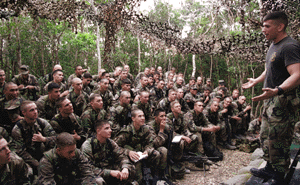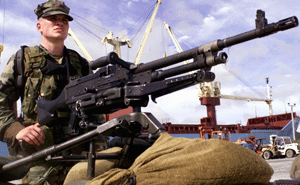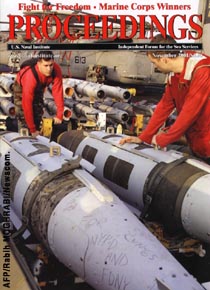The value of forward-deployed Marine infantry battalions is well known.
The Marine Corps rotates six-month deployments among its 24 infantry
battalions to maintain one aboard ships in the Indian Ocean, one on ships in the
Atlantic/Mediterranean region,

In addition to contingencies, new demands require Marines as security forces.
Unfortunately, the worldwide availability of Marine security forces has declined
as the Corps pulled its detachments off aircraft carriers and removed several Marine security
detachments from overseas naval installations.
A temporary solution
has been to task infantry battalions
returning from deployment. These ad hoc arrangements gut battalions and drives personnel
tempo well above 50 percent. The Marine Corps must adapt to these
new demands by routinely deploying an infantry battalion for security missions
worldwide. A Marine infantry battalion designated for a worldwide Marine
Security (MarSec) deployment would conduct normal battalion-level
pre-deployment training. Approximately
90 days
prior to deployment, officers from Marine Forces Atlantic would ask the
Southern, European, and Central Commands if they need Marines.
Recent history and current events will ensure a resounding YES! from around the globe.
The European command may request a few dozen Marines to bolster security at
U.S. embassies in turbulent Africa.
Deployed Marine task forces are are often committed ashore, leaving our
Navy incapable of performing evacuations elsewhere.
Therefore, a deploying aircraft carrier may embark Marines as a landing party, or to enhance port security.
Marines could also bolster security
at embassies in the Balkans, and provide greater protection against terrorist
attacks at US Air Force bases
in Turkey.
 The Central command may want Marines to enhance security at US naval
facilities in Kuwait and Bahrain. The
5th Fleet would like a few dozen Marines as boarding parties for
undermanned ships enforcing the naval blockade in the Persian Gulf. Finally,
The Central command may want Marines to enhance security at US naval
facilities in Kuwait and Bahrain. The
5th Fleet would like a few dozen Marines as boarding parties for
undermanned ships enforcing the naval blockade in the Persian Gulf. Finally,
The demand for Marines is so great that the Pentagon would
have to set priorities. Sixty days
prior to departure, the battalion would split into security companies,
platoons, or even squads, and begin specialized training for
their designated mission. These
Marines would not be committed to a certain mission during their six-month
overseas deployment. They
may be shifted to trouble spots in the same manner as Navy ships.
If a major conflict arises, the entire battalion could reassemble and link up with a
forward-deployed Maritime Pre-positioned
Ship for vehicles and supplies.
Even if the world becomes entirely docile, MarSec Marines
could deploy and train as regional reaction companies at U.S. naval bases
in Puerto Rico, England, Spain, Italy, Greece or Bahrain. In addition, British,
Dutch, and Italian Marines would be happy to host a company of U.S.
Marines for a few months. Security companies
could also link up and train with the Marine battalion deployed aboard
amphibious ships in their region.
Devoting a battalion of Marines to MarSec missions around
the globe will provide greater protection for Americans abroad as the
number of deployed Marine security platoons could increase from three to
twenty. Marines will learn more and
enjoy the variety of real world missions. These
Marine task forces will be "first to fight" since they will already be "in every
clime and place" when the fighting begins.
Carlton Meyer editorG2mil@Gmail.com
©2001 www.G2mil.com
Publication Politics
This article was accepted for publication by the prestigious US Naval Institute
Proceedings (the US Navy's official professional journal with over 100,000
subscribers) in July of 2000. The publication date was not yet
determined. Proceedings had published four of my articles in the
past, but they are extremely careful about rocking boats. However, I felt
this was a short, simple, modest proposal which they may publish to offset
recent criticism that they have become public propaganda rags for the Sea
Services, like the Navy League's "Seapower". After the USS
Cole was attacked in November of 2000, I sent the editor an e-mail reminding
him of this article since it addressed anti-terrorism. He promised to take
a look again, but nothing happened. The day after the September 11, 2001
attacks, our military promised big changes to focus on anti-terrorism, so I sent
another e-mail. Proceedings focuses on the Marine Corps in each
November issue, so the timing was ideal since most print magazine must finalize
everything a month in advance.
This time an assistant editor sent a note a few days later that "Global Marines" was approved for the November issue. Meanwhile the Marine Corps joined most other federal agencies to exploit the 9-11 tragedy to pad their budgets. The Corps announced it would form an "anti-terrorist" brigade, the 4th MEB, basically just another headquarters to command the Corps security forces. A third 500-man FAST company would be formed, allowing the Corps to keep four FAST platoons overseas through unit rotations. The Corps announced that it needed 2000 more active duty Marines for this new anti-terrorist force: 500 for the FAST company and 1500 for unexplained reasons. According to the Marine Times, most Marines were skeptical of this "knee-jerk" reorganization, but the Marine Commandant got the new Secretary of the Navy to approve the idea anyway, while the Corps Generals bragged about their first manpower increase since the end of the Cold war.
As a result, I knew my article was in trouble. After a politically incorrect article was published a few years ago, the Navy and Marine Corps pressured the "independent" editors of Proceedings to grant them a pre-publication review to "prevent embarrassments." Obviously, my article would prove embarrassing since it proposed increasing the number of deployed Marine anti-terrorist platoons from 3 to 20. The Commandant's new 4th MEB plan would only increase platoons from 3 to 4, and required 2000 more full-time Marines. Nevertheless, I got another e-mail saying "Global Marines" was set for publication, so I felt bad about having such cynical thoughts about the Proceedings editor and the Commandant of the Marine Corps. Apparently, they were willing to allow a superior idea to appear in a magazine which describes itself as "an open forum for the Sea Services".
My November issue of Proceedings arrived three weeks later, and "Global Marines" was missing. I didn't bother to inquire why. Meanwhile, taxpayers must pay for 2000 more full-time Marines while 17,000 Marines catch rays on Okinawa where they are not wanted nor needed.
Carlton Meyer editorG2mil@Gmail.com